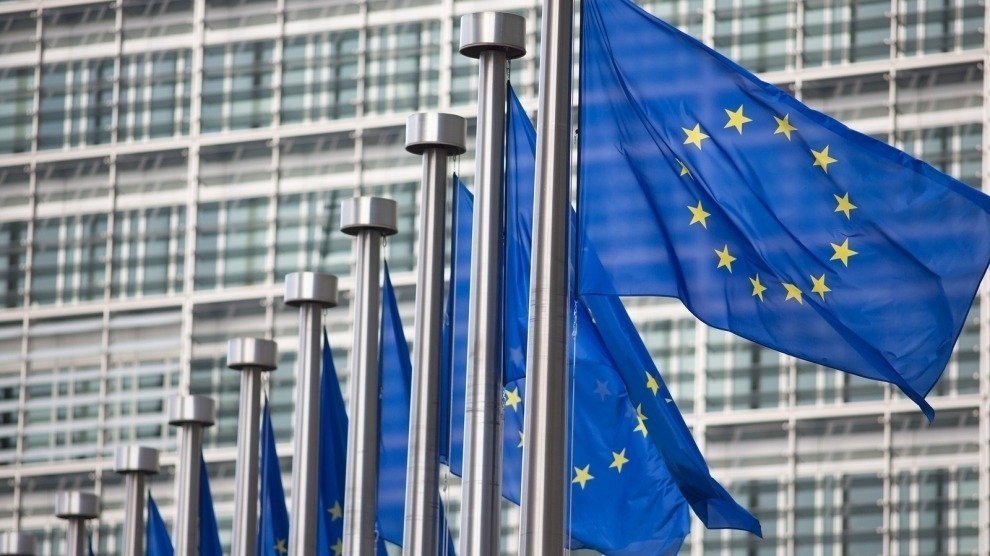Apple faces 500M euro fine following EU music probe
Apple may be the target of a 500 million euro ($538 million) fine from the European Commission, with the regulator expected to impose the charge following its competition probe into how it treats Apple Music's competitors.

EU flags
The European Commission has been investigating whether Apple broke antitrust laws following a 2019 complaint from Spotify, which resulted in a 2020 probe launch. Almost four years later, the European Commission is allegedly preparing to hand out punishments.
According to five people with knowledge of the investigation, the Financial Times reports that the Commission is expected to announce a fine against Apple early in March. The fine, thought to be in the ballpark of 500 million euro, will supposedly be accompanied by a ruling that Apple broke EU laws with its App Store anti-steering rules.
As part of the ruling and fine, Apple also faces being banned from preventing music streaming services from advising customers that they could get a better deal elsewhere than the App Store and the In-App Purchases system. These will apparently be referred to by the EU as "unfair trading conditions."
The wording of the report seemingly indicates the ban will be limited only to streaming services, with Apple potentially still able to apply them against other types of apps.
The timing of the ruling coincides with Apple's efforts to abide by the EU Digital Markets Act, which enables sideloading of third-party app stores and other rule changes affecting only EU citizens, including allowing alternative payment services to be used. Long-time courtroom rival Epic Games already plans to take advantage of the changes, with a return of "Fortnite" to the App Store in EU member states.
In the United States, the anti-steering rules are being changed following the Epic-Apple legal fight, but with significant limitations that make it difficult for developers to actually use.
Read on AppleInsider

Comments
How are all of these impositions and impediments on Apple (and other US technology companies) doing business in the EU improving the competitive situation for EU based smartphone, tablet, computer, headphone, VR/spatial headset, and music/video streaming service producers? Are EU consumers taking advantage of the bludgeoning of the "evil gatekeepers" and suddenly basking in the glory of being able to purchase EU made products and services at more affordable prices? That is the goal, improving choice and driving lower prices, isn't it?
US regulation forced the unbundling of IE from Windows and it opened the web + made Mac a platform that could be used on the level as Windows for most people. And the fear of regulation forced Microsoft to make a deal with Apple to producing MS Office for "at least 5 years" + made a huge investment (+3% of Apple). At that time Apple was 90 days from going bankrupt. Microsoft needed Apple to stay alive to keep US authorities at bay. Thanks to US regulation we still have Apple and competition.
Apple has been factoring in the higher cost of doing business here for over forty years, rest assured.
Social security, mandatory health insurance payments, employment regulations (legal paid vacation, mandatory deadlines for firing people, etc.), mandatory warranty on all products — all those things and a thousand more have always been factored into their pricing schemes.
Yes, with a nominal GDP of almost US$20 trillion projected for 2024, I'm sure they're desperate to collect 500 million Euro from a company violating existing antitrust laws.
And of course, there was this:
https://www.washingtonpost.com/world/asia_pacific/due-to-security-law-south-korea-is-stuck-with-internet-explorer-for-online-shopping/2013/11/03/ffd2528a-3eff-11e3-b028-de922d7a3f47_story.html
But you may say — it isn’t fair that the only way to get to iOS users is through the App Store. That isn’t true — the product could be accessed through a browser. But then you may say — users want to access the product through a native app because of speed and security, so the web based product wouldn’t generate as much revenue. That is true — and who created this platform to allow for this? Why shouldn’t they be paid for developing a platform that allows for greater app engagement and revenue?
I'm not saying this didn't happen to you, but I do doubt that your anecdotal experience translated to a mass exodus of Mac users to switch to WinPCs. If something this widespread had occurred I'm surprised that I wasn't aware of it and that there aren't countless articles easily had. Your comment also indicates that you were able to move to a bank whose online system didn't require ActiveX which means that it was possible to use a bank that supported more open web standards.
https://competition-policy.ec.europa.eu/index/fines_en#:~:text=Fines imposed on undertakings found,following year are reduced accordingly.